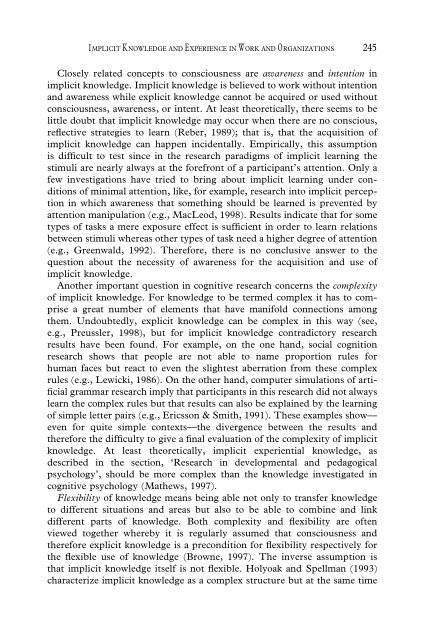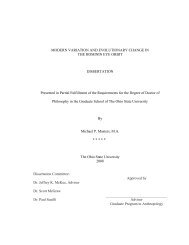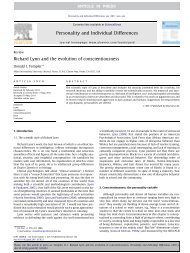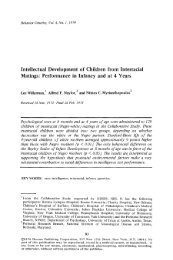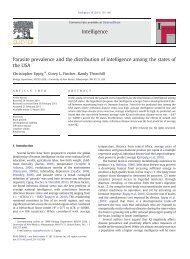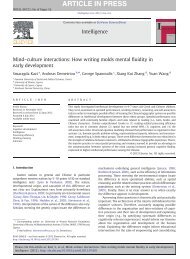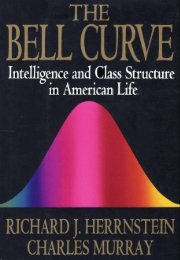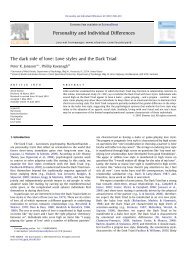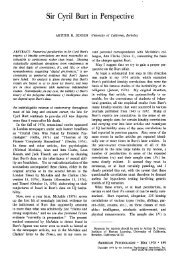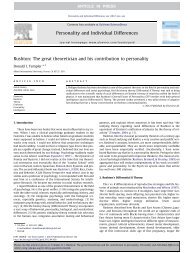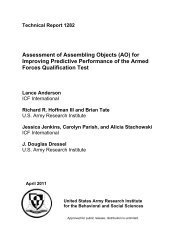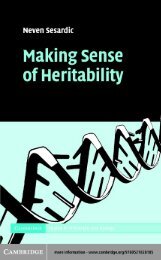International Review of Industrial and Organizational Psychology
International Review of Industrial and Organizational Psychology
International Review of Industrial and Organizational Psychology
You also want an ePaper? Increase the reach of your titles
YUMPU automatically turns print PDFs into web optimized ePapers that Google loves.
IMPLICIT KNOWLEDGE AND EXPERIENCE IN WORK AND ORGANIZATIONS 245Closely related concepts to consciousness are awareness <strong>and</strong> intention inimplicit knowledge. Implicit knowledge is believed to work without intention<strong>and</strong> awareness while explicit knowledge cannot be acquired or used withoutconsciousness, awareness, or intent. At least theoretically, there seems to belittle doubt that implicit knowledge may occur when there are no conscious,reflective strategies to learn (Reber, 1989); that is, that the acquisition <strong>of</strong>implicit knowledge can happen incidentally. Empirically, this assumptionis difficult to test since in the research paradigms <strong>of</strong> implicit learning thestimuli are nearly always at the forefront <strong>of</strong> a participant’s attention. Only afew investigations have tried to bring about implicit learning under conditions<strong>of</strong> minimal attention, like, for example, research into implicit perceptionin which awareness that something should be learned is prevented byattention manipulation (e.g., MacLeod, 1998). Results indicate that for sometypes <strong>of</strong> tasks a mere exposure effect is sufficient in order to learn relationsbetween stimuli whereas other types <strong>of</strong> task need a higher degree <strong>of</strong> attention(e.g., Greenwald, 1992). Therefore, there is no conclusive answer to thequestion about the necessity <strong>of</strong> awareness for the acquisition <strong>and</strong> use <strong>of</strong>implicit knowledge.Another important question in cognitive research concerns the complexity<strong>of</strong> implicit knowledge. For knowledge to be termed complex it has to comprisea great number <strong>of</strong> elements that have manifold connections amongthem. Undoubtedly, explicit knowledge can be complex in this way (see,e.g., Preussler, 1998), but for implicit knowledge contradictory researchresults have been found. For example, on the one h<strong>and</strong>, social cognitionresearch shows that people are not able to name proportion rules forhuman faces but react to even the slightest aberration from these complexrules (e.g., Lewicki, 1986). On the other h<strong>and</strong>, computer simulations <strong>of</strong> artificialgrammar research imply that participants in this research did not alwayslearn the complex rules but that results can also be explained by the learning<strong>of</strong> simple letter pairs (e.g., Ericsson & Smith, 1991). These examples show—even for quite simple contexts—the divergence between the results <strong>and</strong>therefore the difficulty to give a final evaluation <strong>of</strong> the complexity <strong>of</strong> implicitknowledge. At least theoretically, implicit experiential knowledge, asdescribed in the section, ‘Research in developmental <strong>and</strong> pedagogicalpsychology’, should be more complex than the knowledge investigated incognitive psychology (Mathews, 1997).Flexibility <strong>of</strong> knowledge means being able not only to transfer knowledgeto different situations <strong>and</strong> areas but also to be able to combine <strong>and</strong> linkdifferent parts <strong>of</strong> knowledge. Both complexity <strong>and</strong> flexibility are <strong>of</strong>tenviewed together whereby it is regularly assumed that consciousness <strong>and</strong>therefore explicit knowledge is a precondition for flexibility respectively forthe flexible use <strong>of</strong> knowledge (Browne, 1997). The inverse assumption isthat implicit knowledge itself is not flexible. Holyoak <strong>and</strong> Spellman (1993)characterize implicit knowledge as a complex structure but at the same time


